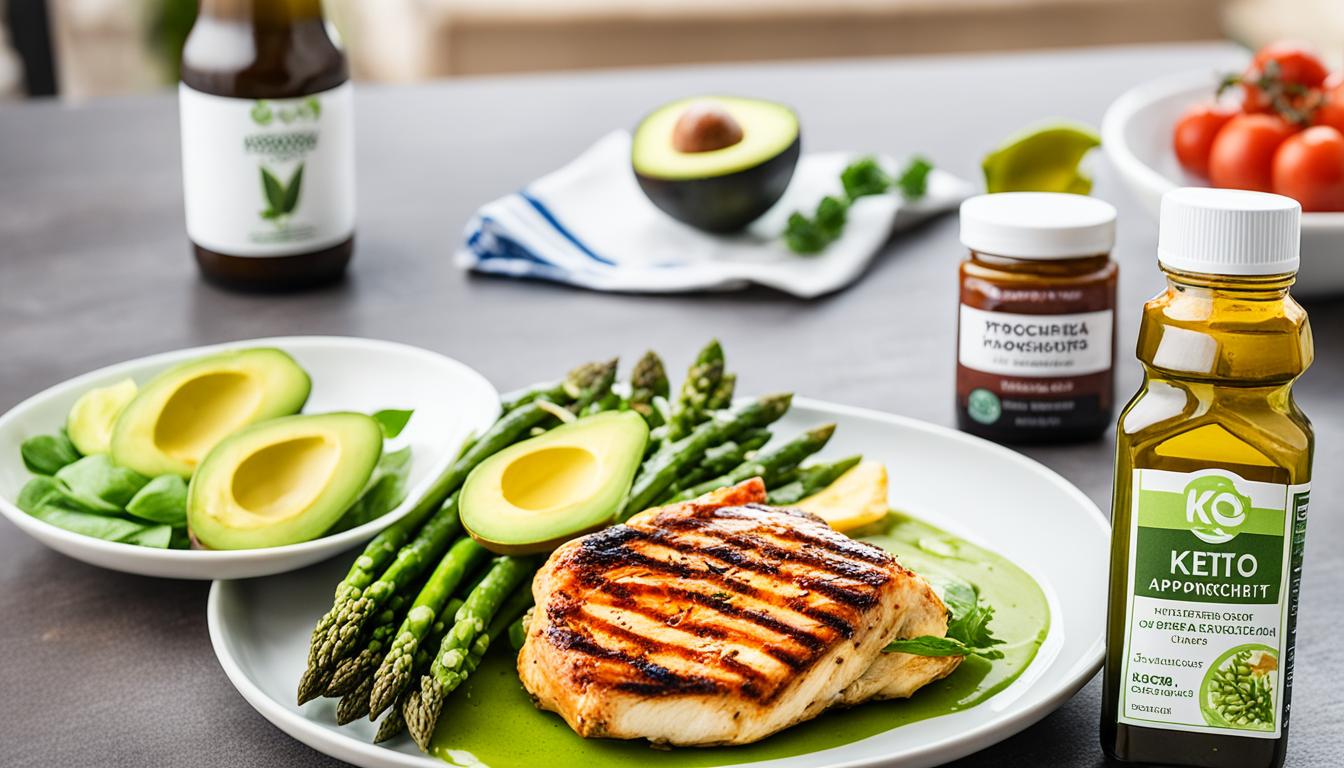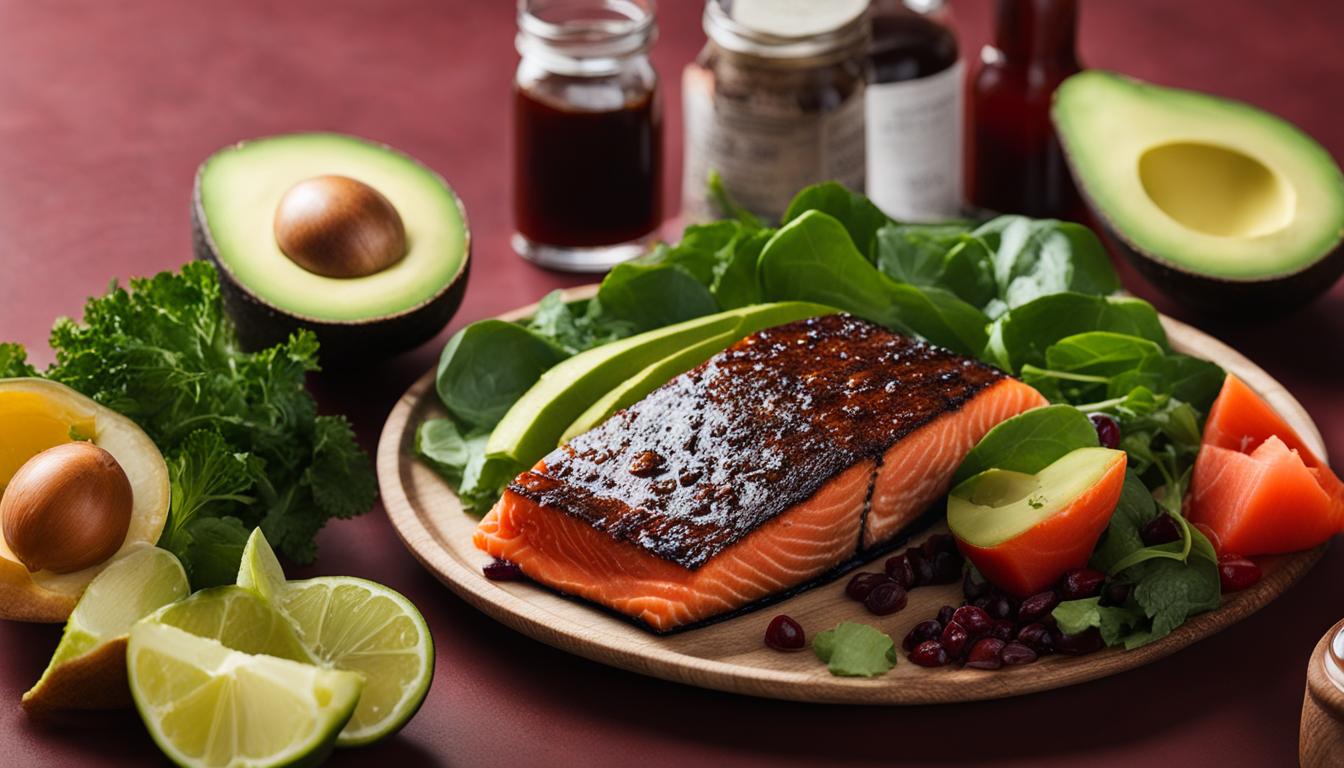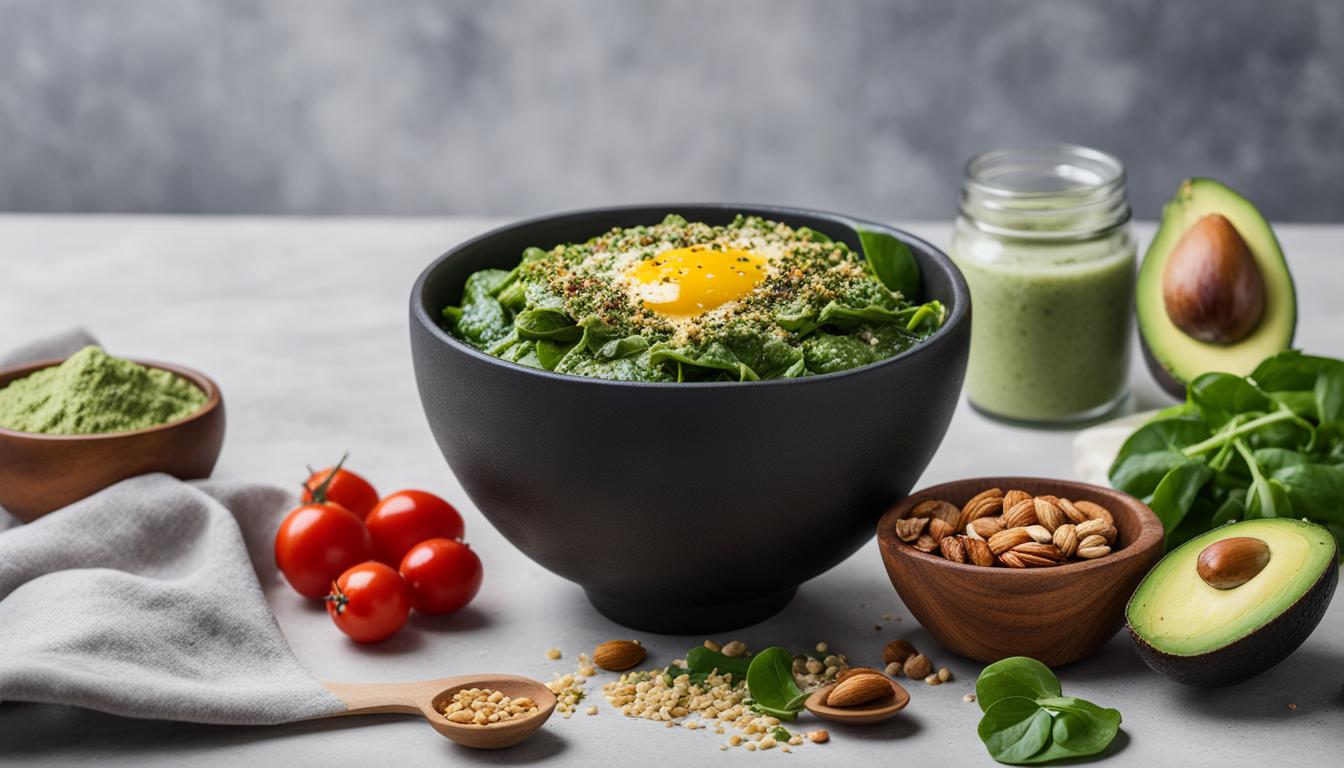Worcestershire sauce is a popular condiment known for its tangy and savory flavor. It is commonly used in various dishes, but if you follow a keto diet, you may be wondering if Worcestershire sauce is keto-friendly. In this article, we will explore the nutritional composition of Worcestershire sauce, the potential impact on a keto diet, and provide practical tips for incorporating or avoiding it in your keto meals.
Key Takeaways
- Worcestershire sauce is not keto-friendly due to its high net carb content.
- It contains 19.17 grams of net carbs per 100 grams, which can disrupt ketosis on a keto diet.
- However, small amounts can be incorporated into a keto diet if carefully tracked and accounted for in the total daily carb intake.
- Be mindful of the carb content of condiments and explore keto-friendly alternatives or homemade recipes to enjoy similar flavors.
The Nutritional Composition of Worcestershire Sauce
When considering a keto diet, understanding the nutritional composition of the foods and condiments you consume is essential. Worcestershire sauce, known for its savory and tangy flavor, contains a diverse range of ingredients that contribute to its taste profile. However, it is important to note that Worcestershire sauce is not suitable for a strict keto diet due to its high net carb content.
Each 100 grams of Worcestershire sauce contains approximately 19.17 grams of net carbs, which can significantly impact your daily carb intake on a keto diet. The sauce includes ingredients such as malt vinegar, spirit vinegar, molasses, sugar, salt, anchovies, tamarind extract, onions, and garlic. While these ingredients add depth to the flavor, they also contribute to the higher carbohydrate content.
Despite its high net carb content, Worcestershire sauce does provide some nutritional benefits. It contains various minerals and vitamins, including sodium, potassium, magnesium, calcium, vitamins A, C, E, and K, as well as trace amounts of other minerals and B-vitamins. However, it is important to consider these nutrients in relation to the overall macronutrient composition of your keto diet.
To help visualize the nutritional content of Worcestershire sauce, here is a table detailing its key components:
| Nutrition Facts per 100g | Amount |
|---|---|
| Net Carbs | 19.17g |
| Protein | 0.5g |
| Fat | 0.2g |
| Sugar | 15.51g |
| Calories | 73 |
While Worcestershire sauce may not be suitable for a strict keto diet, it is essential to consider portion sizes and track your daily carb intake. Small amounts of Worcestershire sauce can be incorporated into a keto diet if carefully accounted for within your daily macronutrient goals.
If you are following a keto diet and still want to enjoy the flavors of Worcestershire sauce, there are low-carb alternatives and homemade recipes available that can be customized to fit within your dietary restrictions. Exploring these options can help you maintain ketosis while still enjoying the tangy taste of Worcestershire sauce.
Health Implications of Worcestershire Sauce on a Keto Diet
While many culinary creations can add flavor and depth to your keto journey, it’s essential to navigate the potential drawbacks of certain ingredients. Worcestershire Sauce, a popular condiment, poses some challenges for those following a keto diet due to its high net carb content. Let’s explore the health implications of incorporating Worcestershire Sauce into your keto meal plan.
“Is Worcestershire Sauce allowed on the ketogenic diet?” The answer is not straightforward. The sauce contains sugar and molasses, both of which are high in carbs. These ingredients can potentially disrupt ketosis, a metabolic state that plays a crucial role in the effectiveness of the keto diet.
Although Worcestershire Sauce is not considered keto-friendly, it can still be enjoyed in small amounts if carefully tracked and accounted for in your total daily carb intake. By doing so, you can satisfy your taste buds without compromising your progress.
In moderation, Worcestershire Sauce provides some nutritional benefits. It contains various minerals, such as sodium, potassium, magnesium, and calcium, along with vitamins A, C, E, and K. However, it’s important to weigh these benefits against the potential setback to ketosis and decide if including Worcestershire Sauce aligns with your keto goals.
For a better understanding, let’s take a closer look at the nutritional composition of Worcestershire Sauce:
| Nutrition Facts | Per 100 grams |
|---|---|
| Net Carbs | 19.17 grams |
| Calories | 88 |
| Total Fat | 0.16 grams |
| Protein | 0.78 grams |
| Sugar | 16.8 grams |
When incorporating Worcestershire Sauce into your keto diet, it’s essential to remember portion control and track the exact amount you consume. By diligently monitoring your carb intake, you can enjoy the flavors of Worcestershire Sauce without jeopardizing ketosis.
However, if you prefer to err on the side of caution, there are keto-friendly alternatives available. Coconut aminos and gluten-free soy sauce can be excellent substitutes for Worcestershire Sauce while still adding that umami flavor to your keto-friendly dishes.
In summary, while Worcestershire Sauce is not typically keto-approved due to its high net carb content, it can be consumed in small quantities if carefully integrated into your total daily carb intake. Remember to prioritize portion control and explore keto-friendly alternatives to satisfy your savory cravings while staying on track with your keto lifestyle.

Practical Tips for Avoiding Worcestershire Sauce on a Keto Diet
Navigating the realm of condiments while maintaining a strict keto diet can be challenging, especially with favorites like Worcestershire Sauce. To avoid Worcestershire Sauce on a keto diet, it is important to be aware of its presence in various dishes and sauces.
Here are some practical tips to help you avoid Worcestershire Sauce and stay on track with your keto journey:
1. Opt for Low-Carb Worcestershire Sauce Options
While traditional Worcestershire Sauce is high in net carbs, there are low-carb alternatives available in the market. These low-carb Worcestershire sauces are formulated specifically for individuals following a keto or low-carb diet. Check the nutrition labels and choose options that have minimal or no added sugars and fewer net carbs per serving.
2. Explore Keto-Friendly Substitutes
If you’re looking for flavorful alternatives to Worcestershire Sauce, consider using keto-friendly substitutes. Coconut aminos, made from coconut sap, is a popular choice among keto enthusiasts. It has a similar savory and slightly sweet taste that can be used as a substitute for Worcestershire Sauce. Another option is gluten-free soy sauce, which is low in carbs and can provide a similar umami flavor.
3. Track Total Daily Carb Intake
When incorporating condiments into your keto diet, it’s essential to track your total daily carb intake diligently. This can be done using apps or tools that calculate and log your macronutrient consumption. By keeping a close eye on your carb intake, you can ensure that small additions of Worcestershire Sauce or any other condiments do not disrupt ketosis.
Remember, every individual’s carbohydrate tolerance is different, so customize your daily carb intake based on your specific needs and goals.
TIP: To make tracking easier, pre-portion condiments like Worcestershire Sauce into small containers, each with a fixed amount of carbs. This way, you can confidently add the desired amount to your meals without the need for constant measurement.
By following these practical tips, you can enjoy a keto-friendly diet while avoiding Worcestershire Sauce. Remember to be mindful of condiment choices and track your carb intake to stay in ketosis and reap the benefits of a ketogenic lifestyle.
Homemade Keto Worcestershire Sauce Recipe
For those following a keto diet who still want to enjoy the flavors of Worcestershire Sauce, there are homemade recipes available that are keto-friendly. These recipes use low-carb ingredients and substitutes for sugar and molasses, making them suitable alternatives to traditional Worcestershire Sauce. By making your own keto Worcestershire Sauce, you can control the carb content and customize the flavors to suit your preferences.
Here’s a simple recipe to try:
Ingredients:
- 1 cup apple cider vinegar
- 1/4 cup coconut aminos
- 2 tablespoons fish sauce
- 1 tablespoon tamarind paste
- 1 tablespoon Dijon mustard
- 1 tablespoon onion powder
- 1 tablespoon garlic powder
- 1 teaspoon ground black pepper
- 1/2 teaspoon ground cloves
- 1/2 teaspoon ground ginger
- 1/4 teaspoon ground cinnamon
- Pinch of cayenne pepper (optional)
Instructions:
- In a small saucepan, combine all the ingredients.
- Bring the mixture to a simmer over medium heat, stirring occasionally.
- Reduce the heat to low and let it simmer for 20-30 minutes to allow the flavors to meld together.
- Remove from heat and let the sauce cool.
- Strain the sauce through a fine-mesh sieve into a jar or bottle.
- Store in the refrigerator for up to a month.
You can now enjoy your homemade keto Worcestershire Sauce as a flavorful addition to your keto-friendly dishes.

Conclusion
In conclusion, while Worcestershire Sauce is a flavorful condiment, it is not considered keto-friendly due to its high net carb content. With 19.17 grams of net carbs per 100 grams, consuming Worcestershire Sauce in larger quantities can quickly eat up a significant portion of the daily carb allowance on a keto diet. The high carb count can potentially disrupt ketosis and hinder the benefits of following a keto diet.
However, it is important to note that small amounts of Worcestershire Sauce can still be incorporated into a keto diet if carefully tracked and accounted for in the total daily carb intake. By closely monitoring the carb content and making adjustments to accommodate the sauce, you can still enjoy its flavors while staying on track with your keto lifestyle.
To maintain a keto-friendly approach, it is crucial to be mindful of the carb content of condiments and explore alternative options that fit within your dietary goals. Consider opting for low-carb Worcestershire sauce varieties or using substitutes like coconut aminos or gluten-free soy sauce. Alternatively, you can explore homemade keto Worcestershire sauce recipes that use low-carb ingredients and substitutes for sugar and molasses.
Ultimately, understanding the carb content of condiments and making informed choices will help you stay on track with your keto diet while still enjoying the flavors you love. By incorporating keto-friendly alternatives or making your own homemade sauces, you can continue to savor delicious meals while following the principles of a keto lifestyle.
FAQ
Is Worcestershire Sauce keto friendly?
Worcestershire Sauce is not considered keto friendly due to its high net carb content.
Can I have Worcestershire Sauce on a keto diet?
While small amounts of Worcestershire Sauce can be incorporated into a keto diet, it must be carefully tracked and accounted for in the total daily carb intake.
What is the nutritional composition of Worcestershire Sauce?
Worcestershire Sauce contains 19.17 grams of net carbs per 100 grams. It also includes ingredients like malt vinegar, spirit vinegar, molasses, sugar, salt, anchovies, tamarind extract, onions, and garlic.
Is Worcestershire Sauce allowed on the ketogenic diet?
Considering its high net carb content, Worcestershire Sauce is not typically allowed on the ketogenic diet. However, small amounts can be consumed if carefully accounted for in the daily carb intake.
What are some practical tips for avoiding Worcestershire Sauce on a keto diet?
Avoid Worcestershire Sauce by opting for low-carb Worcestershire sauce options or using keto-friendly substitutes such as coconut aminos or gluten-free soy sauce.
Can you provide a homemade keto Worcestershire Sauce recipe?
To enjoy the flavors of Worcestershire Sauce while following a keto diet, try making your own keto Worcestershire Sauce using low-carb ingredients and substitutes for sugar and molasses.


